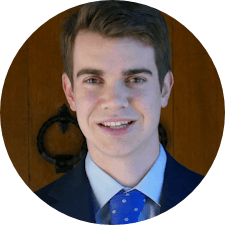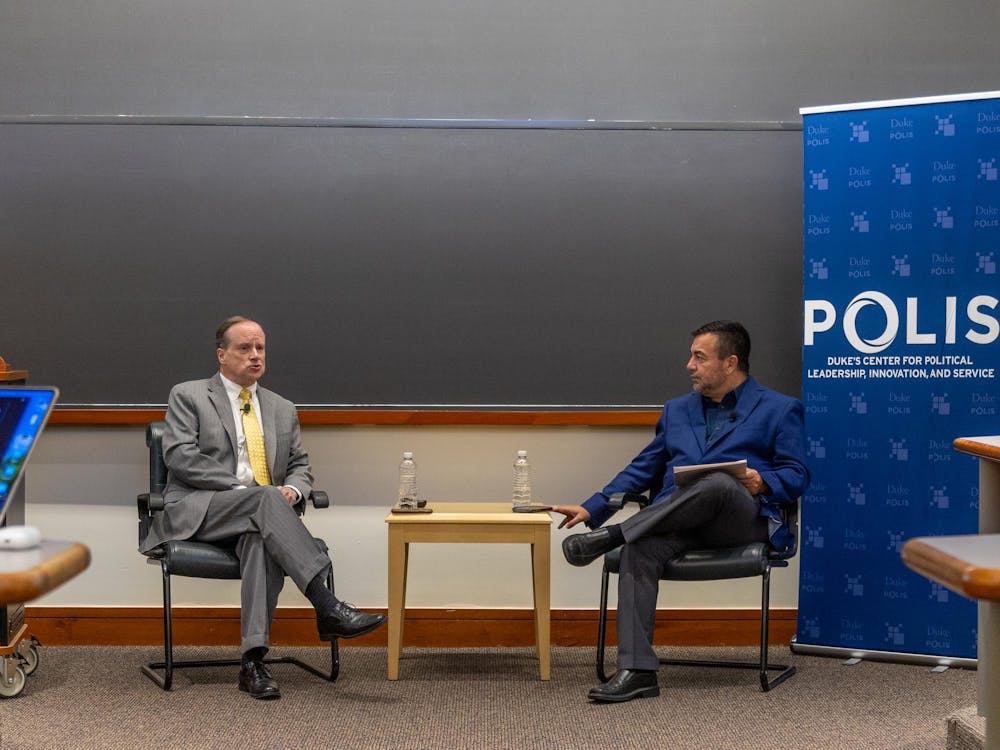John Hood, president of the John William Pope Foundation and adjunct instructor at the Sanford School of Public Policy, spoke to students about the foundations of American conservatism at a Thursday event.
The lecture, titled American Conservatism 101 and hosted by Polis: Center for Politics, outlined the philosophical and psychological underpinnings of American conservatism and the differences between various schools of thought within the ideology.
Hood emphasized that regardless of one’s political allegiances, conservatism is useful to understand because “it’s not going anywhere.”
Conservative schools of thought
In defining conservatism, Hood referred to the writings of historical philosophers and theorists. He positioned American philosopher Frank Meyer as arguing that within conservatism, “you have to accept reality as it is,” which includes the presence of power structures. In Meyer’s view, conservatives should want to “divide that power” and make it difficult for any one group to “monopolize it.”
Meyer’s idea speaks to an American conservative desire to limit the power of the state — not for the purpose of anarchy, but instead because the state “needs to be restricted and carefully controlled,” according to Hood. To Meyer, the government’s functions should be limited to the preservation of peace, justice and national defense.
He detailed three groups of thought that constitute American conservatism: traditionalism, libertarianism and centrism. He identified their differences as illustrated by diverging positions on two axes — the degree of government intervention and the extent to which the government should promote traditional values.
Traditionalists, according to Hood, “think about the argument from virtue” that there are certain “principles, practices, customs [and] institutions that are good for human flourishing.”
To illustrate traditionalist thought, Hood referenced a parable by English author and philosopher G.K. Chesterton. In the story, the rider of a wagon wants to tear down a fence blocking a road and asks an onlooker for help. The onlooker agrees, but only if the rider can explain what the fence is for.
To Hood, the parable illustrates a traditionalist approach to policy issues that it is wise to first consider the potential purpose and usefulness of policies before getting rid of them.
On the other hand, libertarians make an argument for “liberty and freedom.” Hood acknowledged that prominent libertarian author Ayn Rand preferred terms like “privacy or individualism” to describe the school of thought.
According to Hood, libertarians start from a different place than traditionalists, instead arguing that “governments exist to protect rights.”
He explained that while traditionalists “tend to focus on things like abortion, gambling [and] perhaps marriage,” libertarians “tend to focus on taxes and regulations.”
Centrists make an argument from “prudence” or “practicality,” he said. This way of thinking, which is “oriented towards empiricism,” gained a greater prominence with the introduction of social scientists to conservatism in the 1960s, ‘70s and ‘80s.
Shifting his focus to present notions of the ideology, Hood delineated two contemporary groups of conservative thought: national conservatives and freedom conservatives.
National conservatives, he explained, believe that virtues such as “patriotism and courage,” “honor and loyalty” and “congregation and family” are the foundations for “restoring proper public orientation.” Meanwhile, freedom conservatives take a more traditional stance and express concerns over “authoritarianism on the rise on the left and the right” and perceived threats to individual liberty.
As an example of where the camps diverge on contemporary policy issues, Hood noted that while national conservatives oppose free trade because they view it as interfering with the American manufacturing base, freedom conservatives would argue in support of the approach for lowering the cost of living and promoting the economy.
He added that the groups also differ in their view of federalism. While freedom conservatives seek to allow states and localities to “make their own decisions,” national conservatives may advocate for the return of federal power to combat “lawlessness and immorality.”
Q&A session
Abdullah Antepli, professor of the practice at Sanford, director of Polis and moderator of the event, asked Hood about the relationship between conservatism and the GOP. Hood spoke about the possibility of a growing rift between the two camps of conservative thought.
Get The Chronicle straight to your inbox
Sign up for our weekly newsletter. Cancel at any time.
He pointed to multiple states where both chambers of the legislature and the governorship are controlled by Republicans — known as “trifectas” — as evidence of conservatism’s resilience. Nevertheless, he noted that the degree to which the GOP represents the “political vessel” of conservatism is an “open question.”
“I don't want to overstate the case too much, but if the Republican Party becomes more national conservative and drops even more of its freedom-type, Reagan-era type things, some of the people on the freedom conservative side are going to play the field,” Hood said, noting that such conservatives may look to create a third party.
When asked by a student why the Republican Party has only won one national election by popular vote since 1988, Hood argued that the GOP runs “weak candidates for president” and does not “position their issues effectively for presidential elections.” That said, he posited that “Republicans in the last 30 years have been more successful than we ever could have imagined” through congressional and state elections.
One student prompted Hood to weigh in on comments made by former congresswoman Liz Cheney during a Sept. 4 talk at Duke, where she cast doubt on the notion that the “Republican Party can be resuscitated.”
He replied that although he did not agree with Cheney’s statement, he thinks that once Trump is “off the political stage,” there will be more “active contesting” within the party.
A student asked Hood about the normalization of extremist rhetoric, to which Hood warned against statements that suggest the 2024 election is the last election to “save America” or that “this is the most important election in our lifetime.”
“It’s genuinely dangerous to say things like that,” he said, noting that regardless of the election’s outcome, “America is not going to be destroyed.”

Michael Austin is a Trinity junior and managing editor of The Chronicle's 120th volume.

